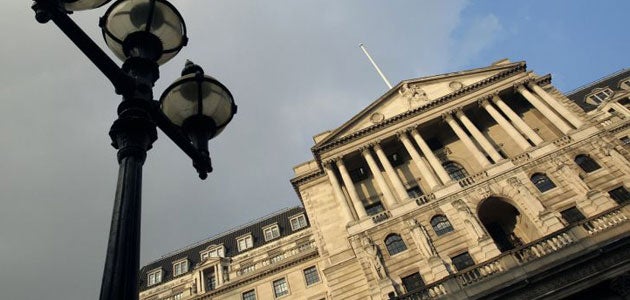£50bn cash boost as rates are held

The Bank of England held interest rates unchanged at their record low of 0.5 per cent today but stepped up its programme to boost the economy with injections of new money.
It is the second month in a row that rate-setters have held the cost of borrowing, as attention turns to the results of its scheme of quantitative easing (QE) - effectively printing money - to ease credit conditions in the ailing economy.
Today the Monetary Policy Committee (MPC) said it planned an additional £50bn for the programme, raising the total to £125bn, from £75bn.
The MPC has spent more than £50bn so far on assets including Government and corporate debt.
Chancellor Alistair Darling has given the Bank permission to spend a total of £150bn in the QE programme.
In a statement today, the Bank said: "The world economy remains in deep recession.
"Output has continued to contract and international trade has fallen precipitously.
"The global banking and financial system remains fragile despite further significant intervention by the authorities."
The timing of the move - with one month still to go for the original £75bn scheme - came as a surprise to many analysts, who had forecast no update on the strategy until at least next month.
The MPC predicted today that it would take another three months to complete the enlarged £125bn programme.
It added it would "keep the scale of the programme under review".
Both rates and QE are designed to keep inflation under control and the MPC will have made today's decision in the light of the Bank's inflation report, which is due next week and should shine more light on policymakers' predictions for the economy.
Hetal Mehta, senior economic adviser to the Ernst & Young ITEM Club, said much of the initial QE pot was spent on gilts - government guaranteed debt.
She said: "The lack of relevant data makes it difficult to monitor the success of QE but with gilt yields creeping up, this has forced the Bank into using up more of the £150bn available.
"With deflation unlikely to be a major concern thanks to the weak sterling keeping the cost of imports up, ITEM expects interest rates to be kept at 0.5 per cent over the course of this year."
Today's decision comes in the wake of a sustained period of cuts from the MPC, which has slashed rates to the lowest level in the Bank's history.
But it is likely to keep rates on hold as it weighs the effect of QE on the UK's recession-hit economy.
Analysts believe further rate cuts are unlikely due to the potential impact on banks' margins and their willingness to lend, so the focus is set to stay on QE.
The Bank's latest trends in a lending survey revealed a mixed picture when it was released at the end of last month.
Major lenders reported only a limited improvement in mortgage supply since the beginning of the year, but some indicated a willingness to make more credit available to businesses and individuals.
The MPC has had much to chew over in its two-day meeting, including the shock figures showing the UK economy plunged further into recession with a 1.9 per cent dive in output during the first three months of 2009.
A significant factor which will have been weighed up was data showing the UK experienced its first period of deflation in almost 50 years in March, as the Retail Prices Index (RPI) measure of inflation fell to minus 0.4 per cent.
Meanwhile, the official Consumer Prices Index (CPI) measure also fell to 2.9 per cent but was still well above the Government's 2 per cent target.
Today the Bank said CPI inflation is likely to drop below the 2 per cent target later this year, driven in part by lower food and energy prices.
But recent surveys from manufacturing, services and construction sectors have appeared to suggest that the speed of the UK's slump has slackened.
Ian McCafferty, chief economic adviser to the CBI business group, said: "Quantitative easing is still in its very early stages, and we saw a positive response immediately after the Bank began investing in gilts.
"For it to be fully effective, it should support money supply growth and broader lending, as well as boost liquidity.
"It will be some time before we have hard evidence of whether it is having the desired effects, but more businesses are telling us they see some of the credit freeze starting to thaw, and fewer of them report that conditions are getting worse."
Subscribe to Independent Premium to bookmark this article
Want to bookmark your favourite articles and stories to read or reference later? Start your Independent Premium subscription today.

Join our commenting forum
Join thought-provoking conversations, follow other Independent readers and see their replies